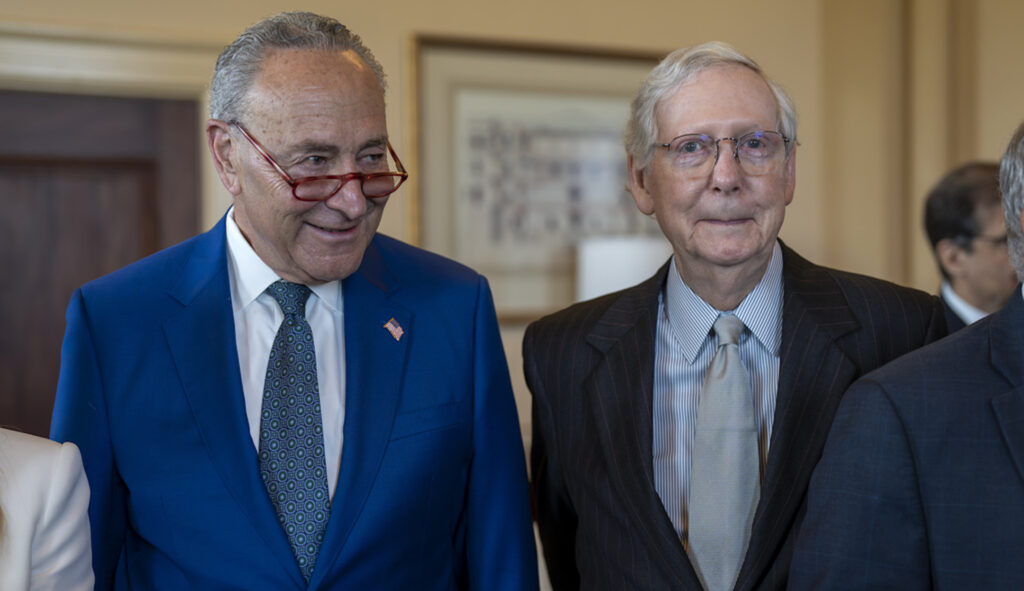Senate Majority Leader Chuck Schumer (D-NY) and Minority Leader Mitch McConnell (R-KY) are putting on a united front to pass the defense supplemental spending bill.
A bipartisan working group of senators has spent more than a month negotiating a border security deal, which would be added to a defense spending bill that includes aid for Ukraine, Israel, and Taiwan. Negotiators on both sides have acknowledged that the border measure is critical to passing the legislation through both chambers.
McConnell, who has been Ukraine’s staunchest GOP ally since Russia launched its war last February, has said he supports the larger supplemental bill as long as it includes “credible” border policy changes.
Schumer and McConnell have been in lockstep on supporting the effort to combine Israel and Ukraine aid. The two have also backed the inclusion of border security, though they differ on specifics, as a means to push the bill through both chambers. Taiwan assistance was additionally included to help broaden support for the bill.
McConnell spent much of President Joe Biden’s first term working to protect the filibuster, the Senate rule requiring 60 votes to advance major pieces of legislation. The issue divided Democrats and largely unified Republicans as the Senate rule upended Biden’s legislative agenda.
Democrats currently control the Senate 51-49, leaving them in need of nine Republican votes to bypass the filibuster and send the supplemental to the House.
The top Senate Republican said this past week that he had been urging his members to get on board with the bill because he did not believe Democrats would agree to any border reforms if ousted from the White House in November.
“One of the things I keep reminding my members is if we had a 100% Republican government — president, House, Senate — we would probably not get a single Democratic vote” on a border security measure, McConnell told reporters on Wednesday.
“This is a unique opportunity to accomplish something in divided government,” he added.

Sen. James Lankford (R-OK) and Sen. Chris Murphy (D-CT) have been leading the negotiations, which have centered largely on changes to federal asylum policy and how the Biden administration uses the humanitarian parole authority. Sen. Kyrsten Sinema (I-AZ) has also been heavily involved in the talks.
There have also been reports that the White House has offered to establish a new border expulsion law and increase mandatory detention rates as part of the negotiations, though no one from the Senate working group or the Biden administration has confirmed as much publicly.
Negotiations now largely center on disputes over parole system reforms, which remains the biggest sticking point.
The top Senate Republican has already faced multiple efforts by anti-Ukraine members of his conference to push a stand-alone Israel aid bill through the chamber, which he helped block. He also, however, voted down Schumer’s efforts to invoke cloture on the defense bill because negotiators had failed to reach a deal on the border measure.
While more than half of the 49 GOP senators support some type of continued aid to Ukraine, there is a vocal part of the conference that strongly opposes such measures. There is also the issue of former President Donald Trump, who has significant sway with House Republicans and has begun urging GOP lawmakers to oppose the deal.
On the Democratic side, Schumer faces a reckoning from progressives and Hispanic members who have felt left out of negotiations on the border deal and oppose enhanced restrictions on immigrants.
The legislation is expected to eventually pass the Senate with bipartisan support if negotiators can reach an agreement. Even if Republicans were to secure concessions from Democrats in the Senate talks, the bill would face considerable opposition from House GOP lawmakers who oppose Ukraine aid.
House Speaker Mike Johnson (R-LA) has publicly insisted that the border provision in Biden’s defense legislation be the Senate’s version of H.R. 2, House Republicans’ signature border bill. Senate GOP negotiators, however, have pushed back on the notion that they are demanding Democrats agree to H.R. 2.
Johnson has also told Senate Republicans that it would be difficult to pass the upper chamber’s bipartisan bill even with a substantial border deal, which negotiators have thus far failed to reach.
Johnson has begun to face threats to his speakership over the supplemental spending request, with lawmakers saying they’d file a motion to vacate and paralyze the House if he were to pass Ukraine aid.
Asked how such issues in the House could impact the supplemental’s chances of passing, Rep. Jason Crow (D-CO) suggested that Democrats would be willing to form a coalition government to keep the lower chamber from losing another speaker.
“We can go to Speaker Johnson and say, ‘We understand the challenges that you’re facing, but let’s come together, let’s see what we can do to provide some buffer to you to make a deal and maybe some element of protection to get this done,’” Crow explained. “Because if we do, it could be incredible for our country in a very positive way.”
The anti-Ukraine faction is far bigger on the House side, where Johnson is a largely untested leader, and McConnell has little influence over the growing isolationist wing of the GOP. Several House Republicans have also voiced their concern about signing on to a border deal with a Democratic president during an election year.
CLICK HERE TO READ MORE FROM THE WASHINGTON EXAMINER
Speaking to those concerns, Rep. Dan Crenshaw (R-TX) decried those who would oppose a border deal for political purposes.
“How many hundreds of thousands of illegals would you allow in the country just because it might help your chances of the election?” Crenshaw told reporters on Thursday. “I ran for Congress literally on getting the border secure. So if I have a chance to do that and I don’t do that, I’m a traitor.”
